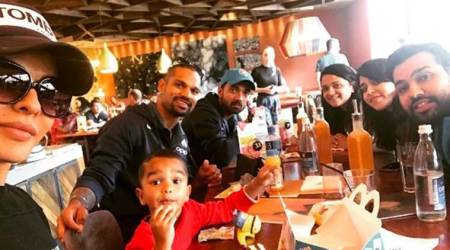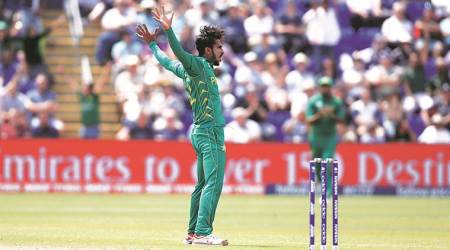 With 10 wickets in four matches, Hasan Ali leads the highest wicket-takers list. (Source: Reuters)
With 10 wickets in four matches, Hasan Ali leads the highest wicket-takers list. (Source: Reuters)
“Yeh kaun hai, do daant ka bakra?” That was the first reaction that Hasan Ali heard as he walked in for his first-ever press conference a year ago following his Pakistan Super League (PSL) debut. It only got worse from there though. Most of the questions that followed were loosely based on the same theme of “who are you?” and “what are you doing here?” as the youngster shifted gingerly on his chair and mumbled monosyllabic responses. It had been a rather emotional day for Ali.
Earlier that afternoon, Mohammad Akram, former Pakistan fast bowler and coach of Peshawar Zalmi- Ali’s PSL franchise-had informed his protégé about being picked in the playing XI. As he recalls now, there was also a stirring lecture.
“I told him, ‘This is not your place. Your place is in the national team. Your PSL debut might be your first game at such a big level. But you should consider this only as a club game and think you’re made for bigger things’,” Akram tells The Indian Express. Ali took only a solitary wicket in that first match before having to deal with the baptism by fire by the Pakistani media post it. In only a couple of months, Ali was at Dublin, donning national colours in an ODI against Ireland and making his mentor’s prediction come true. By then, the whole of Pakistan knew who the wiry youngster was, their latest pace sensation.
And his name and reputation only kept rising as the year went on. No bowler has taken more ODI wickets, 38 of them, than Ali since he made his debut. And at the Champions Trophy, he’s duly announced himself to the cricket world with three-wicket hauls—and big wickets at that—in three straight matches against South Africa, Sri Lanka and England to lead his team into the final on Sunday. He also presently sits clearly on top as the leading wicket-taker of the tournament.
Ali is a misnomer of sorts when you think of Pakistani fast bowlers. The archetypal Pakistani fast bowler was always someone blessed with broad, Herculean shoulders like say a Shoaib Akhtar, height like Wasim Akram or Mohammad Irfan though he’s more a freak or a lithe, muscular frame like a Waqar Younis or Aaqib Javed.
 Hasan Ali is a misnomer of sorts when you think of Pakistani fast bowlers. (Source: AP)
Hasan Ali is a misnomer of sorts when you think of Pakistani fast bowlers. (Source: AP)
All in the wrists
Ali unfortunately possesses none of those physical traits. And it’s not surprising when you hear Akram say that many around him were astonished when he picked Ali up from an emerging camp and began investing time and energy in him like he was the next big thing. You can see why on the basis of the damage he’s caused with the ball.
Though he’s known for his variations, he’s also shown the ability to generate deceptive pace and get the ball to move off the surface on occasions. Akram puts it all down to Ali’s wrist position, which he can’t stop gushing about. “Whoever said I was crazy to invest in him, I told them that I can see that spark and the wrist position I’m looking for. For me, he’s a bit like Dale Steyn or Vernon Philander. He can hold his wrist position. They haven’t used him much with the new-ball but I think he can become a very good new-ball bowler for Pakistan. And he already has the ability to reverse swing the ball,” he says.
“He generates pace and moves the ball because of that wrist position and high-arm action. You don’t always have to be as tall as Mohammad Irfan or Joel Garner,” he quips.
It was this wrist position that caught Akram’s eye in the first place and convinced him to pick Ali as one of the two emerging players for his franchise for the PSL last year. But the former Pakistan bowling coach realized that the youngster wasn’t a finished product yet and decided to test him.
The results only further testified Akram’s gut-feel, and he wasn’t the only member of the Zalmi camp who was impressed. “I put him under pressure in trial matches, and we had hitters like Darren Sammy and Shahid Afridi. I did that with him. But he came through all those challenges really well without losing his wrist position. What I saw was that his head also remains very still, which is why he’s so consistent with his yorkers because. He never strayed once,” says Akram.
Afridi’s appraisal
It turns out it was Afridi who told Akram that it was time for Ali to get the nod and that it was Zalmi’s chance to provide a potential superstar for Pakistan. The time with Zalmi turned Ali’s life around off the field too.
Hailing from the tiny town of Ludhay Wala on the outskirts of Gujranwala, Ali didn’t quite have the facilities to hone his skills. It was his elder brother, Ataur Rehman, who was the first to spot his talent and rallied the people of their hometown to support Ali by developing basic facilities. But at Zalmi, Ali has not only gotten an opportunity to rub shoulders with the who’s who of the cricket world, he’s also got a chance to succeed in life away from the cricket.
“We pay them a stipend or have them on monthly wages. We also support and encourage their education and Ali is one of our brightest students. He’s a great listener and constantly in search of new ideas and skills. You can’t keep him quiet in the dressing-room when he’s around the senior players, and it shows in his performances on and off the field,” says Akram.
Ali unfortunately didn’t make a great first impression against India earlier in the tournament, dropping a crucial catch of Yuvraj Singh and also going for plenty of runs later in the innings. He’ll get a second chance now to set the record straight and ensure even the Indians know who he is, and he couldn’t ask for a better platform than the Champions Trophy final.

